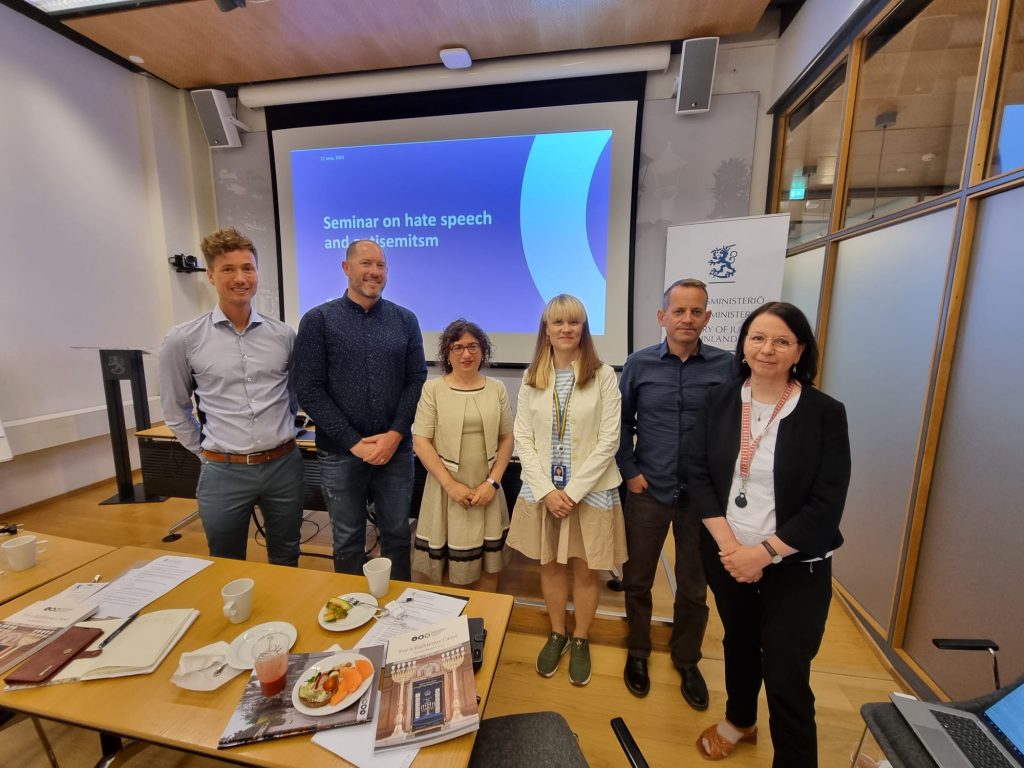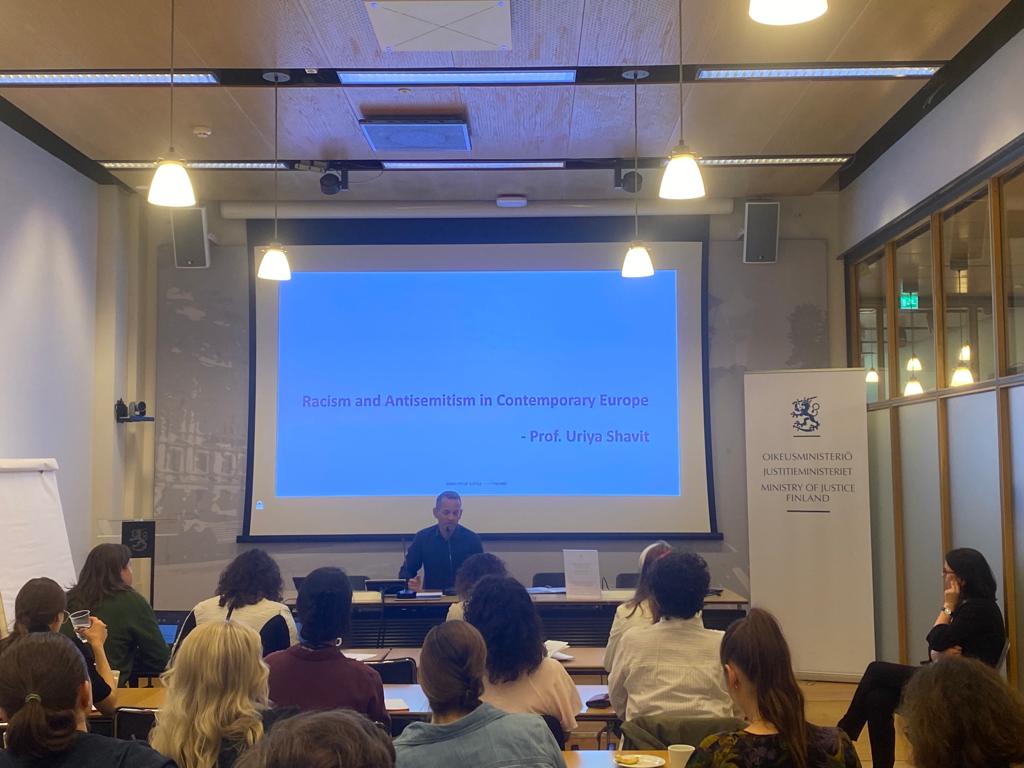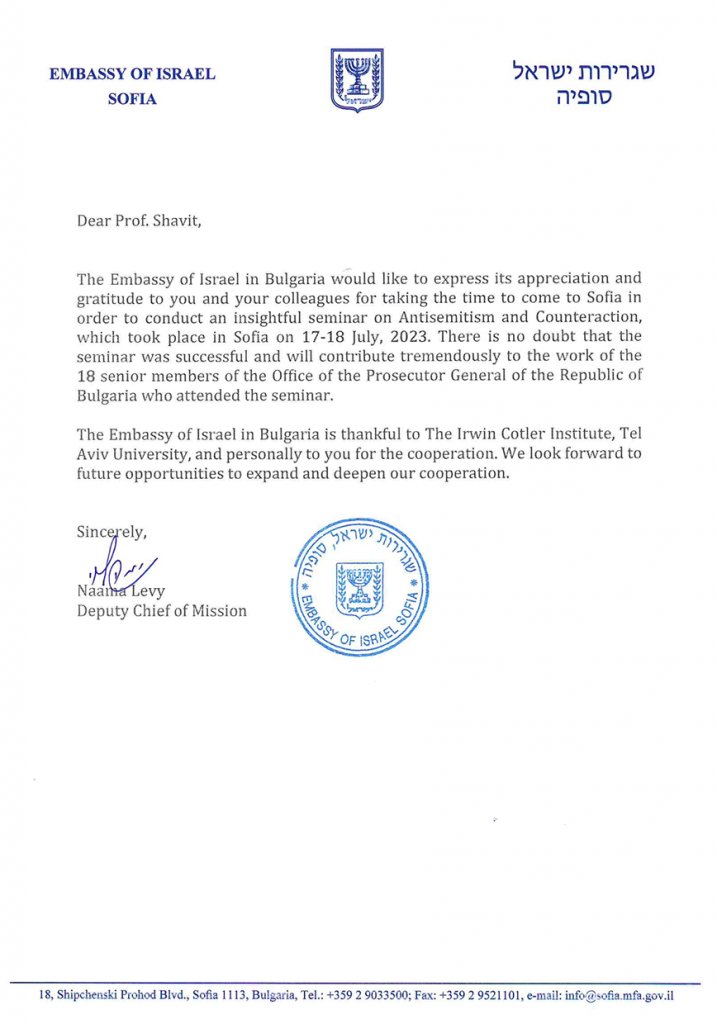International Workshops on Antisemitism and Racism

In June 2023, the Institute led one-day seminar in Finland for public officials, law enforcers, diplomats and other officials on hate speech, racism, and antisemitism in Europe and the world and the means to fight them. The seminar was initiated and organized together with the Embassy of Israel in Finland and with Finland’s Ministry of Justice.
The seminar was attended by more than 80 senior officials from various Finnish government bodies including, among others: the Justice Ministry; the Central Finland Police Department; the Embassies of Finland in Budapest and in Vilnius; the Ministry of Foreign Affairs; the Helsinki Police Department; the Ministry of Interior; the National Bureau of Investigation, and the Prime Minister’s Office.
Prof. Uriya Shavit, the Head of the Institute, lectured on racism and antisemitism in contemporary Europe, while Dr. Carl Yonker, the Institute’s Academic Director, spoke on online radicalization and the means of countering it, and Dr. Fabian Spengler addressed violent and racist sports fans, offering policy proposals for countering racism in stadiums. An additional lecture focusing on the history of antisemitism in Finland was given by University of Helsinki scholar Dr. Paavo Ahonen.
In the opening ceremony in Helsinki, Israel’s Ambassador to Finland and Estonia, H.E Hagit Ben-Yaakov, noted the importance of learning to identify antisemitism, raising awareness about racism in general, and prosecuting antisemitic criminal acts. She mentioned an incident in which a sticker with a Nazi symbol was placed on the embassy gate in Helsinki and the subsequent investigation that did not result in an arrest or prosecution. The Finnish Ministry of Justice’s Head of Department, Ms. Johanna Suurpää, emphasized racism and discrimination must be dealt with effectively.
The timing of the seminar and the topics it covered, ironically, were perfect. Just a week after the seminar, Finland’s economy minister and member of the right-wing populist Finns Party, Vilhelm Junnila, was forced to resign over comments about Nazism and his connection to a far-right event linked to neo-Nazis. He had only been in office for ten days and the swift response – removing a minister from the country’s second largest party – should be applauded.
In conversation with Ms. Suurpää, and Ms. Mia Luhtassari, Senior Specialist at the Ministry of Justice, following the seminar, both commented on the challenges faced by the Ministry and law enforcement in countering online radicalization and prosecuting hate crimes. Ms. Suurpää stated that while there was better cooperation between governments and tech companies, there remains much work to be done to close existing gaps.


Riga
In Latvia, the Institute and the Israeli Embassy in cooperation with the Latvian Police held a one-day seminar similar to the one held in Helsinki for ranking law enforcers in Riga, including investigators, unit heads, and patrol officers. Topics covered included antisemitism, racism, the far-right in Europe, online radicalization, and racism among fan-support groups for sports teams.

Sofia
In July 2023, the Institute led a two-day seminar in Bulgaria for 20 public prosecutors and investigators with Bulgaria’s Ministry of Justice on hate speech, racism, antisemitism, online misinformation, and the means to fight them. The seminar was initiated and organized together with the Embassy of Israel in Bulgaria and with Bulgaria’s Ministry of Justice.
Prof. Uriya Shavit, the Head of the Institute, lectured on racism, the roots of contemporary antisemitism and the history of early Zionism, while Dr. Carl Yonker, the Institute’s Academic Director, spoke on the state of contemporary antisemitism and the radical right in Europe and the United States. In addition, Mr. Eran Vasker lectured on online antisemitism and hate speech and the means to monitor them, and Mr. Moses Toshimasu spoke about Japan as a case study that demonstrates that antisemitism does not require Jews or involvement in the Arab-Israeli conflict to exist.

